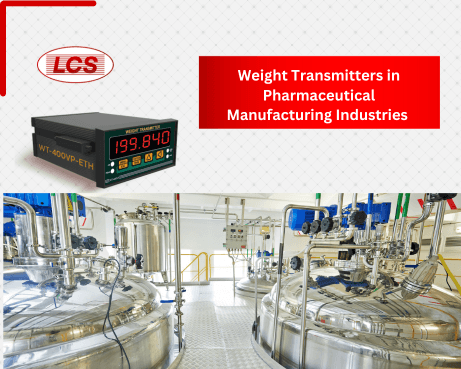Oct 23, 2024
Weight Transmitters in Pharmaceutical Manufacturing Industries
Introduction
Weight transmitters play a crucial role in the pharmaceutical manufacturing industry.
These devices are essential for ensuring precision in weighing processes, which is vital for maintaining product quality, regulatory compliance, and operational efficiency.
In this article, we will explore the importance of weight transmitters in pharmaceutical manufacturing, their working mechanisms, key applications, benefits, and the factors to consider when selecting these devices.
What Are Weight Transmitters?
Weight transmitters are electronic devices that convert the mechanical force exerted by an object into an electrical signal. This signal is then processed and transmitted to a display or control system, allowing operators to monitor and control the weight of materials throughout the manufacturing process. Weight transmitters can be integrated with various types of load cells, which are sensors that measure weight.
Importance of Weight Transmitters in Pharmaceutical Manufacturing
Precision and Accuracy: In pharmaceutical manufacturing, precise measurements are critical. Even minor variations in weight can lead to significant changes in product formulation, affecting efficacy and safety. Weight transmitters ensure accurate weight measurements, reducing the risk of errors.
Regulatory Compliance: The pharmaceutical industry is heavily regulated. Weight transmitters help manufacturers comply with stringent regulations set by agencies like the FDA (Food and Drug Administration) and EMA (European Medicines Agency). Accurate weighing is essential for batch control and documentation, which are necessary for audits and inspections.
Quality Control: Maintaining product quality is paramount in pharmaceuticals. Weight transmitters enable consistent monitoring of raw materials, intermediates, and final products. This ensures that products meet specified weight criteria, contributing to overall quality assurance.
Operational Efficiency: Automated weighing processes reduce manual handling and improve efficiency. Weight transmitters can be integrated into production lines, allowing for real-time monitoring and adjustments. This minimizes downtime and enhances productivity.
Working Mechanism of Weight Transmitters
Weight transmitters operate on the principle of converting mechanical force into an electrical signal. The main components include:
Load Cell: This is the core component that senses weight. When a load is applied, the load cell deforms slightly, generating a change in electrical resistance. This change is proportional to the weight applied.
Signal Conditioning: The raw signal from the load cell is usually weak and requires amplification and filtering. Signal conditioning circuits process the signal, making it suitable for further analysis.
Analog to Digital Conversion: The conditioned analog signal is then converted into a digital format, allowing for accurate representation and processing of the weight measurement.
Display and Output: The weight transmitter provides a display for operators to monitor weight in real-time. Additionally, it can transmit data to a central control system for further analysis or automation.
Key Applications in Pharmaceutical Manufacturing
Ingredient Weighing: Accurate weighing of raw materials is essential for producing formulations that meet specific standards. Weight transmitters ensure that the correct amounts of active pharmaceutical ingredients (APIs) and excipients are used.
Batch Control: In batch manufacturing processes, weight transmitters help monitor the weight of each batch, ensuring that the specified quantities are achieved. This is critical for maintaining consistency in production.
Packaging: Weight transmitters are used to verify the weight of packaged products, ensuring they meet legal requirements and customer expectations. This is especially important for products sold by weight.
Quality Assurance: During quality control testing, weight transmitters are employed to measure the weight of samples, confirming that they adhere to predefined specifications.
Benefits of Using Weight Transmitters
Enhanced Accuracy: Weight transmitters provide precise measurements, reducing the likelihood of discrepancies in production.
Increased Efficiency: Automating the weighing process minimizes human error and speeds up production.
Cost Savings: Accurate measurements lead to better resource utilization, reducing waste and costs associated with rework.
Real-time Monitoring: Weight transmitters enable continuous monitoring, allowing for immediate adjustments to processes as needed.
Improved Compliance: With accurate data logging and reporting capabilities, weight transmitters help manufacturers maintain compliance with industry regulations.
Considerations for Selecting Weight Transmitters
When selecting weight transmitters for pharmaceutical manufacturing, consider the following factors:
Accuracy and Precision: Look for transmitters with high accuracy and repeatability to ensure consistent measurements.
Compatibility with Load Cells: Ensure the weight transmitter is compatible with the load cells used in your system, as different applications may require different types of load cells.
Environmental Conditions: Consider the operating environment, including temperature, humidity, and potential exposure to chemicals. Select transmitters that can withstand these conditions.
Calibration and Certification: Choose weight transmitters that are easy to calibrate and come with certification for traceability, ensuring compliance with industry standards.
Communication Protocols: Check for compatibility with existing systems. Weight transmitters should support common communication protocols for easy integration into control systems.
User-friendly Interface: A user-friendly display and controls can enhance the ease of operation, especially in environments where multiple operators are involved.
Conclusion
Weight transmitters are essential tools in the pharmaceutical manufacturing industry, providing precision and accuracy in weighing processes. Their role in regulatory compliance, quality control, and operational efficiency cannot be overstated.
By understanding the importance of weight transmitters and considering key factors in their selection, pharmaceutical manufacturers can improve their processes, ensure product quality, and maintain compliance with industry standards.
As technology advances, weight transmitters will continue to evolve, providing even greater capabilities and efficiencies for the pharmaceutical manufacturing sector.
Looking for the best Weight Transmitters to install in your Pharmaceutical Industry ?
LCS Controls is the right place!
Contact us For Orders
Call: 044-4006 8302, 4862 9378
sales@lcscon.com


